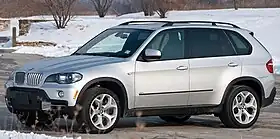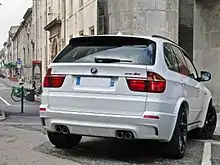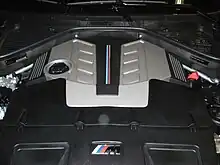BMW X5 (E70)
The BMW E70 is the second-generation BMW X5 mid-size luxury SUV. It replaced the BMW X5 (E53) in July 2006. It was manufactured alongside the BMW X6 at BMW's Greer, South Carolina plant in the U.S. and BMW's facility in Toluca, Mexico.
| BMW X5 (E70) | |
|---|---|
 | |
| Overview | |
| Manufacturer | BMW |
| Production | 7 July 2006 – 28 June 2013 |
| Model years | 2007–2013 |
| Assembly |
|
| Designer | Pierre Leclercq (2003)[2] |
| Body and chassis | |
| Class | Mid-size luxury SUV |
| Body style | 5-door SUV |
| Related | BMW X6 (E71) |
| Powertrain | |
| Engine | Petrol 3.0 L N52/N55 I6 4.4 L N63/S63 V8 4.8 L N62 V8 Diesel: 3.0 L M57/N57 I6 |
| Transmission | 6-speed automatic with Steptronic 8-speed ZF 8HP automatic |
| Dimensions | |
| Wheelbase | 2,933 mm (115.5 in) |
| Length | 4,854 mm (191.1 in) M: 4,851 mm (191.0 in) |
| Width | 1,933 mm (76.1 in) M: 1,994 mm (78.5 in) |
| Height | 2007-08: 1,766 mm (69.5 in) 2009-: 1,776 mm (69.9 in) M: 1,764 mm (69.4 in) |
| Chronology | |
| Predecessor | BMW X5 (E53) |
| Successor | BMW X5 (F15) |
Design
The E70 BMW X5 was 60 mm (2.4 in) wider, 165 mm (6.5 in) longer; with a 110 mm (4.3 in) longer wheelbase, but remains at the height of the E53 X5 at 1,766 mm (69.5 in).
Technology

The xDrive AWD system updates previewed in the facelifted X5 have continued with further detail improvements for the E70. It uses a double wishbone suspension at the front.[3] The manual transmission is entirely dropped, leaving only the automatic transmission.
The E70 features many new technological advancements for this class as standard equipment including BMW's iDrive system, electronic 'joystick' gearshift (no mechanical connection to the gearbox to save space in the console), LED taillamps, the first ever all-polypropylene single module fender module,[4] and options such as heads-up display (HUD), active steering, active damping, and Dynamic Drive which uses active anti-roll bars employing a hydraulic servo in the middle to actively counteract body roll.[3] The X5 has a rollover risk of 17.4%.[5]
The interior of the X5 is completely new. It has a large center-mounted display screen and the simplified iDrive, a man-machine interface system also found in the rest of the BMW model range. The E70 further incorporates many comfort options such as a glass panorama-roof, and, for the first time in a BMW, an optional third row seat which has increased the seating capacity in E70 to 7 passengers, addressing criticism of the E53 model which had been regarded as being slightly too small for this market segment.
The E70 is also the first production vehicle to use FlexRay, a new extremely fast electrical bus system; it is only used for the control of the chassis damping system. The new 'joy-stick'-style electronic space-saving shifter has since been adopted in the new 2007 BMW 5 Series.
For the 2010 model year the X5 received the new iDrive system and the BMW individual audio system along with various other minor updates.
Technical features which other BMW models use also:
- Active steering- changes the steering ratio depending on the speed and driving style
- Adaptive Drive with Active Roll Stabilization and adaptive shock absorbers
- Head-up display - critical information projected onto the windshield
- Comfort Access - keyless access and engine start
- Daytime running lights on the "Corona Rings" around the main headlight units
- Four-zone climate control
New is the Park Distance system that can be integrated into the image of the optional rearview camera.
During the Volkswagen emissions violations, an X5 diesel was used as an example of a compliant vehicle.[6][7][8][9]
BMW X5 M (2010–13)
.jpg.webp)


The BMW X5 M is a high-performance derivative of the X5. It was introduced to the press at the New York Auto Show in April 2009 and started appearing in BMW dealerships in September 2009, for the 2010 model year. It competes with cars such as the Mercedes-Benz ML63 AMG, the Porsche Cayenne Turbo S, and the Jeep Grand Cherokee SRT8. At the time of its launch, it was the most powerful car in its class.
The BMW X5 M is the first xDrive all-wheel-drive vehicle from M GmbH along with the X6 M. The M offers the same utility as the regular X5, with the addition of the V8 M TwinPower Turbo, a twin-turbocharged 4.4-liter V8 delivering 547 bhp (408 kW; 555 PS) at 5,750 rpm and peak torque of 501.2 lb⋅ft (680 N⋅m), available between 1,500 and 5,650 rpm. The S63 engine is a high output variation of the N63 power unit.
The X5 M can sprint from a standstill to 60 mph (97 km/h) in 4.0 seconds, and a quarter-mile (402 m) time of 12.5 seconds with a trap speed of 112 mph (180.2 km/h) was recorded by Car and Driver magazine.[10] In the same test, the X5 M bested the 0–60 mph (97 km/h) and quarter-mile times of the 2009 Porsche Cayenne Turbo S, the 2009 Jeep Grand Cherokee SRT-8, and the 2010 Range Rover Sport Supercharged. In wet conditions, the X5 M went around the Top Gear Test Track in 1:28.2, 5.1 seconds faster than the Audi Q7 V12 TDI.
Coupled with special suspension specifically optimized for M that features Adaptive Drive and the newly developed M Servotronic power steering, the performance Sport Activity Vehicle promises very competent handling. Other high-tech features include launch control for maximum acceleration and a six-speed M Sport automatic transmission optimized for performance. Drivers can manually select gears using either paddles or an electronic gear selector lever. Electronically controlled, variable power distribution to the front and rear axle prevents the tendency to oversteer or understeer, before DSC Dynamic Stability Control is required to cut in.
The BMW X5 M features the biggest brakes on a BMW production vehicle, with 15.55" (395x36mm) rotors up front clamped by four-piston calipers, and 15.2" (385x24mm) rotors at the rear with single-piston calipers. Although traction control is standard, the M Dynamic Mode (MDM) reduces the effect of the system, allowing some wheelspin and drift-type cornering.
For the 2013 model lineup, BMW introduced the M Performance Package available for the xDrive35i and xDrive50i. The M Performance Package models have nearly identical features to the X5 M (sport suspension, wider fenders, staggered wheels, etc.) excluding the quad-tip exhaust, headlights, and engines. The M Performance Package also bumped up the engine output for both models - an additional 15 hp (11 kW) for the xDrive35i and 40 hp (30 kW) for the xDrive50i (torque was also increased by 30 lb-ft for both).[11][12]
M Performance Parts were available for the X5 M. These include black kidney grilles, steel pedals, a sport steering wheel and M rims.
Model lineup
Engines

Petrol engines
| Model | Years | Engine code | Power | Torque |
|---|---|---|---|---|
| 3.0si | 2007–2008 | N52B30 | 272 PS (200 kW; 268 hp) at 6,650 | 315 N⋅m (232 lb⋅ft) at 2,750 |
| xDrive30i | 2009–2010 | |||
| xDrive35i | 2011–2013 | N55B30 | 306 PS (225 kW; 302 hp) at 5,800[13] | 400 N⋅m (295 lbf⋅ft) at 1,200–5,000[13] |
| 4.8i | 2007–2008 | N62B48 | 355 PS (261 kW; 350 hp) at 6,300 | 475 N⋅m (350 lb⋅ft) at 3,400–3,800 |
| xDrive48i | 2009–2010 | |||
| xDrive50i | 2011–2013 | N63B44 | 408 PS (300 kW; 402 hp) at 5,500-6,400 | 610 N⋅m (450 lbf⋅ft) at 1,750–4,500 |
| M | 2010-2013 | S63B44 | 555 PS (408 kW; 547 hp) at 6,000 | 680 N⋅m (502 lbf⋅ft) at 1,500–5,650 |
Diesel engines
| Model | Years | Engine code | Power | Torque |
|---|---|---|---|---|
| 3.0d | 2007–2008 | M57TU2D30 | 235 PS (173 kW; 232 hp) at 4,000 | 520 N⋅m (384 lbf⋅ft) at 2,000–2,750 |
| xDrive30d | 2009–2010 | |||
| 3.0sd | 2007–2008 | 286 PS (210 kW; 282 hp) at 4,400 | 580 N⋅m (428 lbf⋅ft) at 1,750–2,250 | |
| xDrive35d | 2009-2010 | |||
| xDrive35d US Market | 2009–2013 | M57Y Twin Turbo | 269 PS (198 kW; 265 hp) at 4,200 | 576 N⋅m (425 lb⋅ft) at 1,750 |
| xDrive30d | 2011–2013 | N57D30O0 | 245 PS (180 kW; 242 hp) at 4,000 | 540 N⋅m (398 lbf⋅ft) at 1,750 |
| xDrive40d | 2010–2013 | N57D30T0 Bi Turbo | 306 PS (225 kW; 302 hp) at 4,400 | 600 N⋅m (443 lbf⋅ft) at 1,500–2,500 |
| M50d | 2012-2013 | N57S tri Turbo | 381 PS (280 kW; 376 hp) at 4,400 | 740 N⋅m (546 lbf⋅ft) at 2,000–3,000 |
Since 2008, vehicles sold with diesel engines in the United States are equipped with selective catalysator using Diesel exhaust fluid (DEF) to reduce NOx emissions, while vehicles sold in Europe had a bypass exhaust pipe only due the regulations which ended up in Dieselgate.[14]
Transmissions
All models include a 6-speed Steptronic automatic transmission. The new 8-speed transmission is standard in the xDrive50i and xDrive35i from 2011 model year.[15]
Performance
| Model | top speed (km/h) | 0–100 km/h (0–62 mph) (s) | Fuel consumption (ECE) (L/100 km) | CO2-emission (g/km) | Kerb weight (EU) | ||||
|---|---|---|---|---|---|---|---|---|---|
| Petrol | |||||||||
| 3.0si | 210 km/h (130 mph) | 8.1 | 10.2 | 244 | 2,260 kg (4,980 lb) | ||||
| xDrive30i | 225 km/h (140 mph) | 8.1 | 10.2 | 244 | 2,260 kg (4,980 lb) | ||||
| 4.8i, xDrive48i | 240 km/h (149 mph) | 6.5 | 12.0 | 286 | 2,420 kg (5,340 lb) | ||||
| X5 M | 250 km/h (155 mph), 275 km/h (171 mph) with M Driver's Package | 4.7 | 13.9 | 325 | 2,434 kg (5,366 lb) | ||||
| xDrive35i[16] | 242 km/h (150 mph) | 6.8 | 10.1 | 236 | 2,250 kg (4,960 lb) | ||||
| xDrive50i[16] | 250 km/h (155 mph) | 5.5 | 12.5 | 292 | 2,440 kg (5,380 lb) | ||||
| Diesel | |||||||||
| 3.0d | 210 km/h (130 mph) | 8.0 | 8.2 | 217 | 2,150 kg (4,740 lb) | ||||
| xDrive30d (2008–2010) | 216 km/h (134 mph) | 8.0 | 8.2 | 214 | 2,150 kg (4,740 lb) | ||||
| 3.0sd, xDrive35d | 235 km/h (146 mph) | 6.9 | 8.3 | 220 | 2,335 kg (5,148 lb) | ||||
| xDrive30d (2010-) | 210 km/h (130 mph) | 7.6 | 7.4 | 195 | 2,150 kg (4,740 lb) | ||||
| xDrive40d | 237 km/h (147 mph) | 6.6 | 9.2 | 198 | 2,185 kg (4,817 lb) | ||||
Safety
- Winner of Top Safety Pick 2008 by Insurance Institute for Highway Safety.[17]
2010/2011 X5 "Life Cycle Impulse" (LCI) Changes
In 2010 the X5 underwent a "Life Cycle Impulse" (LCI) update, debuted at the New York Auto Show in April 2010 and introduced as 2011 models in BMW North America markets. The changes included revised styling, primarily of the front and rear bumpers, air intakes, headlights, and taillights as well as new exterior and interior colors and new options combination. It also included BMW Group's latest infotainment system. HD Radio, previously an option, was now standard on all X5 models in North America.
More significantly, a new range of engines, all turbocharged and with direct injection was introduced. In the North American market, available gasoline power trains are the xDrive 35i twin-scroll turbo six-cylinder and the xDrive50i twin turbo V8, both coupled to an eight-speed automatic Steptronic transmission. These petrol engines are more powerful than their predecessors, with the 35i also providing improved fuel mileage and reduced emissions. The xDrive 35d turbodiesel carries over in the NA market with the six-speed transmission unchanged from the previous model year. The xDrive40d was also introduced along with a revised xDrive30d, but neither was available in the North American market.[19]
The X5M engine and transmission remains the same.
- Pre-facelift styling
_4.8i_01.jpg.webp) Front (4.8i)
Front (4.8i)_3.0d_02.jpg.webp) Rear (3.0d)
Rear (3.0d)
- Post-facelift styling
_xDrive35i_wagon_(2011-11-18)_01.jpg.webp) Front (xDrive35i M Sport)
Front (xDrive35i M Sport)_%E2%80%93_Heckansicht%252C_2._Juli_2011%252C_D%C3%BCsseldorf.jpg.webp) Rear (xDrive30d)
Rear (xDrive30d)
BMW X5 Security Plus
It is a variant with safety glass, heavy-duty material and ballistics-resistant steel modifications. It comes with a 4.8l engine with Steptronic automatic transmission. Armour is rated to safety class VR4 and is configured to carry a roof mounted 7.62mm, AK-47 assault rifle.[20] The vehicle sells for approximately $220,000.
Vision Efficient Dynamics
It is a hybrid electric vehicle model featuring 2.0 L four-cylinder variable twin-turbo diesel engine rated 204 PS (150 kW; 201 hp) and 400 N⋅m (295 lbf⋅ft) at 2,000–2,250 rpm, a 15-kilowatt electric motor driven by a lithium ion battery pack, eight-speed transmission developed by BMW and ZF, roof-mounted solar panels, 19-inch light alloy wheels with reduced ventilation.[21] It was unveiled in 2008 at the Geneva Auto Show.[22][23][24]
References
- "Группа компаний Автотор :: Автомобили BMW" (in Russian). Avtotor.ru. Retrieved 4 November 2010.
- "Former BMW Designer Pierre Leclercq Joins China's Great Wall Motors". Formtrends.com. 20 July 2013. Retrieved 20 July 2013.
- Tan, Paul. "2007 BMW X5 4.8i Test Drive in Athens". Paultan.org. Retrieved 3 October 2010.
- "Polypropylene provides an economic aid to automotive industry recovery and advance". Borealisgroup.com. Archived from the original on 27 October 2010. Retrieved 3 October 2010.
- "2013 BMW X5 Xdrive35D SUV AWD". U.S. Department of Transportation. Retrieved 23 September 2015.
- "How A Little Lab in West Virginia Caught Volkswagen's Big Cheat". NPR. 24 September 2015. Retrieved 16 September 2015.
- Franco, Vicente; Posada Sánchez, Francisco; et al. (11 October 2014). "Real-world exhaust emissions from modern diesel cars". International Council on Clean Transportation. Retrieved 22 September 2015.
- "EPA's notice of violation of the Clean Air Act to Volkswagen". International Council on Clean Transportation. 18 September 2015. Retrieved 28 July 2016.
- Thompson, Gregory J.; Carder, Daniel K.; et al. (15 May 2014). "In-Use Emissions Testing of Light-Duty Diesel Vehicles in the United States" (PDF). WVU Center for Alternative Fuels, Engines, and Emissions. Retrieved 22 September 2015.
- "X5 M vs. Grand Cherokee SRT8, Range Rover Sport Supercharged, Cayenne Turbo S". Car and Driver. Archived from the original on 8 July 2011. Retrieved 10 August 2011.
- "Review: 2013 BMW X5 M Package - Get Noticed without Six Figure Price Tag". 9 March 2013.
- "2013 BMW X5 Review, Ratings, Specs, Prices, and Photos".
- "BMW X5 xDrive35i - Model Overview - BMW North America". Bmwusa.com. Retrieved 10 August 2011.
- Hans Koberstein and Markus Steinhausen: Der saubere Diesel – Wie Nachrüstung doch funktioniert Archived 4 April 2019 at the Wayback Machine, ZDF – "Frontal21", 11 Dezember 2018 (YouTube)
- "Officially Official: 2011 BMW X5 goes all turbo". autoblog.com. 9 February 2010. Archived from the original on 9 February 2010. Retrieved 9 February 2010.
- Interone Worldwide GmbH (17 June 2008). "BMW X5 : Technical data". Bmw.com. Retrieved 10 August 2011.
- BMW X5 Safety BMW News: X5 and X3 Top Safety Picks
- 2013 BMW X5 Xdrive35I SUV AWD | Safercar – NHTSA
- "BMW Group PressClub Global". Press.bmwgroup.com. Retrieved 10 August 2011.
- "BMW X5 Security Plus". BMW Security Vehicles. Retrieved 25 March 2011.
- Lavrinc, Damon (21 February 2008). "Geneva '08 Preview: BMW twin-turbo diesel hybrid X5". Autoblog.com. Retrieved 3 October 2010.
- Massy, Kevin (4 March 2008). "BMW's X5 shows its vision for Efficient Dynamics | Crave". CNET. Retrieved 22 October 2009.
- "BMW Reveals It's [sic] Vision Efficient Dynamics Hybrid-Diesel X5 Concept". AutoSpies Auto News. 21 February 2008. Retrieved 1 May 2017.
- "BMW Vision EfficientDynamics. Part1". 29 August 2009. Retrieved 1 May 2017 – via YouTube.
External links
- Official website
- 2007 BMW X5 Road Test from Motortrend.com